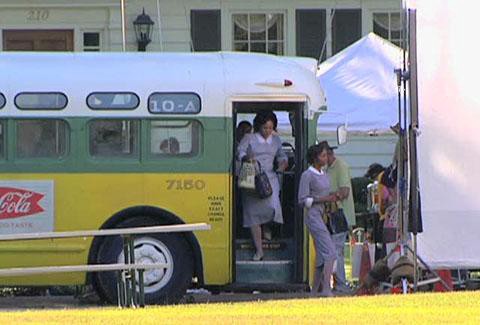Meet the Heroes of the Hilton Head Hospitality Industry
To keep tourist hubs humming, employers import labor — from hours, or even countries, away

Summer is prime travel season, but for many prime travel destinations, it’s also a challenge: how can they attract and retain the staff they need? From Hilton Head, SC, to the equally stifling and prosperous island of Manhattan, the cost of living is so high that the people who are needed to make the beds, fry the food, and empty the trash cans for the millions of annual visitors can’t afford to live even anywhere close to where they work.
In the case of Hilton Head, where the median home value is almost $450,000, many of those staffers live in impoverished rural communities two-and-a-half hours away. That means there are hundreds of workers rising before dawn and stumbling home in the darkness via overpacked buses, having worked a full day and commuted a total of five hours. And they’re paying $2,000 a year for the privilege of earning a wage.
In an eye-opening series of stories about this arrangement, Island Packet reports:
Since the 1970s, Hilton Head has imported hospitality workers from neighboring rural counties where jobs are scarce.
It’s an odd arrangement — the busing in of workers, nearly all of whom are African-American, to serve the island’s visitors. Some critics have called it exploitive. … The majority of Hilton Head employers, who get their workers delivered to their doorsteps, pay nothing — apart from the indirect support they give the bus system through local, state and federal taxes.
The buses seem to provide service that’s maybe half a notch above the bare minimum. They’re over-air-conditioned, so riders bring fleeces, jackets, and caps. They’re also over-full, so some unlucky “riders” have to stand in the aisle the whole way. But, when they don’t break down, they get workers where they’re going — so long as passengers don’t mind a whole lot of waiting, as a deep dive into the bus system makes clear:
Palmetto Breeze’s commuter routes have only one pickup and drop off time.
The bus that serves Allendale, for example, picks up riders just one time each day at 5 a.m. and returns only at 7:30 p.m. Many passengers on the buses work housekeeping and fast food jobs, which often don’t start until late morning, several hours after the bus arrives on Hilton Head. The limited bus schedules mean workers often have to wait three or four hours without pay before their work shifts begin.
It’s not just a worker problem. It also affects employers who rely on the employees, including Popeyes Louisiana Kitchen. Its manager, Troy Dempsey, who regularly hires workers who ride Palmetto Breeze, said the limited schedule means riders can only work between 10:30 a.m. when the store opens and 4:30 p.m. when the buses begin returning to pick up workers. That schedule doesn’t align with the needs of island restaurants that are often busiest at night.
Maybe it would make sense for various hotels and restaurants to put up their employees somehow, so that they could live where they work, at least during the peak summer season? That can pose problems, too — especially when the college students lured to the island feel lied to and betrayed.
The 20-year-old Filipino student doesn’t even bother to take off her grease-stained polo shirt from the Bi-Lo grocery store on Hilton Head Island before she plops on an air mattress in her tiny, 10-by-10 foot bedroom, surrounded by boxes of ramen noodles and Nike shoes she bought as gifts for family back home.
She pays no mind to the other air mattress and cushions that serve as her roommates’ makeshift beds crammed beside her own.
Here, spread out on the $15 mattress she bought at Walmart, 8,900 miles from home, Regine can think. And one thought, playing on an endless loop, dances in her head.
This is not the America I was promised.
The series is on-going, so we’ll have to check back to hear more about other related issues, such as the barriers to affordable housing efforts on Hilton Head itself. Meanwhile, it’s clear that the divide between the rich and poor in this country has become a chasm, and the poor must go to increasingly impressive lengths to leap over that chasm — just so that they can earn their $9 an hour and then go back home.
Support The Billfold
The Billfold continues to exist thanks to support from our readers. Help us continue to do our work by making a monthly pledge on Patreon or a one-time-only contribution through PayPal.
Comments